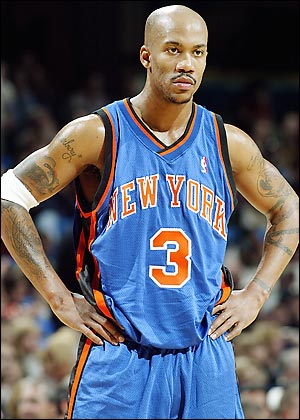Here's his latest about the housing crash debacle. As Krugman points out, Greenspan, who oversaw unregulated lending and then cashed in by writing one of the most inane books in history, was (and is) a super-ultra-crazy-wacko libertarian conservative in the mold of his messiah, an equally insane writer by the name of Ayn Rand. Greenspan was lucky to oversee the late 90s economic boom, but unfortunately he will not be remembered for legitimating Bush's crippling tax cuts, allowing--and ENCOURAGING--the debt to explode, and setting up the conditions for a housing collapse...enjoy
Blindly Into the Bubble
When announcing Japan’s surrender in 1945, Emperor Hirohito famously explained his decision as follows: “The war situation has developed not necessarily to Japan’s advantage.”
There was a definite Hirohito feel to the explanation Ben Bernanke, the Federal Reserve chairman, gave this week for the Fed’s locking-the-barn-door-after-the-horse-is-gone decision to modestly strengthen regulation of the mortgage industry: “Market discipline has in some cases broken down, and the incentives to follow prudent lending procedures have, at times, eroded.”
That’s quite an understatement. In fact, the explosion of “innovative” home lending that took place in the middle years of this decade was an unmitigated disaster.
But maybe Mr. Bernanke was afraid to be blunt about just how badly things went wrong. After all, straight talk would have amounted to a direct rebuke of his predecessor, Alan Greenspan, who ignored pleas to lock the barn door while the horse was still inside — that is, to regulate lending while it was booming, rather than after it had already collapsed.
I use the words “unmitigated disaster” advisedly.
Apologists for the mortgage industry claim, as Mr. Greenspan does in his new book, that “the benefits of broadened home ownership” justified the risks of unregulated lending.
But homeownership didn’t broaden. The great bulk of dubious subprime lending took place from 2004 to 2006 — yet homeownership rates are already back down to mid-2003 levels. With millions more foreclosures likely, it’s a good bet that homeownership will be lower at the Bush administration’s end than it was at the start.
Meanwhile, during the bubble years, the mortgage industry lured millions of people into borrowing more than they could afford, and simultaneously duped investors into investing vast sums in risky assets wrongly labeled AAA. Reasonable estimates suggest that more than 10 million American families will end up owing more than their homes are worth, and investors will suffer $400 billion or more in losses.
So where were the regulators as one of the greatest financial disasters since the Great Depression unfolded? They were blinded by ideology.
“Fed shrugged as subprime crisis spread,” was the headline on a New York Times report on the failure of regulators to regulate. This may have been a discreet dig at Mr. Greenspan’s history as a disciple of Ayn Rand, the high priestess of unfettered capitalism known for her novel “Atlas Shrugged.”
In a 1963 essay for Ms. Rand’s newsletter, Mr. Greenspan dismissed as a “collectivist” myth the idea that businessmen, left to their own devices, “would attempt to sell unsafe food and drugs, fraudulent securities, and shoddy buildings.” On the contrary, he declared, “it is in the self-interest of every businessman to have a reputation for honest dealings and a quality product.”
It’s no wonder, then, that he brushed off warnings about deceptive lending practices, including those of Edward M. Gramlich, a member of the Federal Reserve board. In Mr. Greenspan’s world, predatory lending — like attempts to sell consumers poison toys and tainted seafood — just doesn’t happen.
But Mr. Greenspan wasn’t the only top official who put ideology above public protection. Consider the press conference held on June 3, 2003 — just about the time subprime lending was starting to go wild — to announce a new initiative aimed at reducing the regulatory burden on banks. Representatives of four of the five government agencies responsible for financial supervision used tree shears to attack a stack of paper representing bank regulations. The fifth representative, James Gilleran of the Office of Thrift Supervision, wielded a chainsaw.
Also in attendance were representatives of financial industry trade associations, which had been lobbying for deregulation. As far as I can tell from press reports, there were no representatives of consumer interests on the scene.
Two months after that event the Office of the Comptroller of the Currency, one of the tree-shears-wielding agencies, moved to exempt national banks from state regulations that protect consumers against predatory lending. If, say, New York State wanted to protect its own residents — well, sorry, that wasn’t allowed.
Of course, now that it has all gone bad, people with ties to the financial industry are rethinking their belief in the perfection of free markets. Mr. Greenspan has come out in favor of, yes, a government bailout. “Cash is available,” he says — meaning taxpayer money — “and we should use that in larger amounts, as is necessary, to solve the problems of the stress of this.”
Given the role of conservative ideology in the mortgage disaster, it’s puzzling that Democrats haven’t been more aggressive about making the disaster an issue for the 2008 election. They should be: It’s hard to imagine a more graphic demonstration of what’s wrong with their opponents’ economic beliefs.









